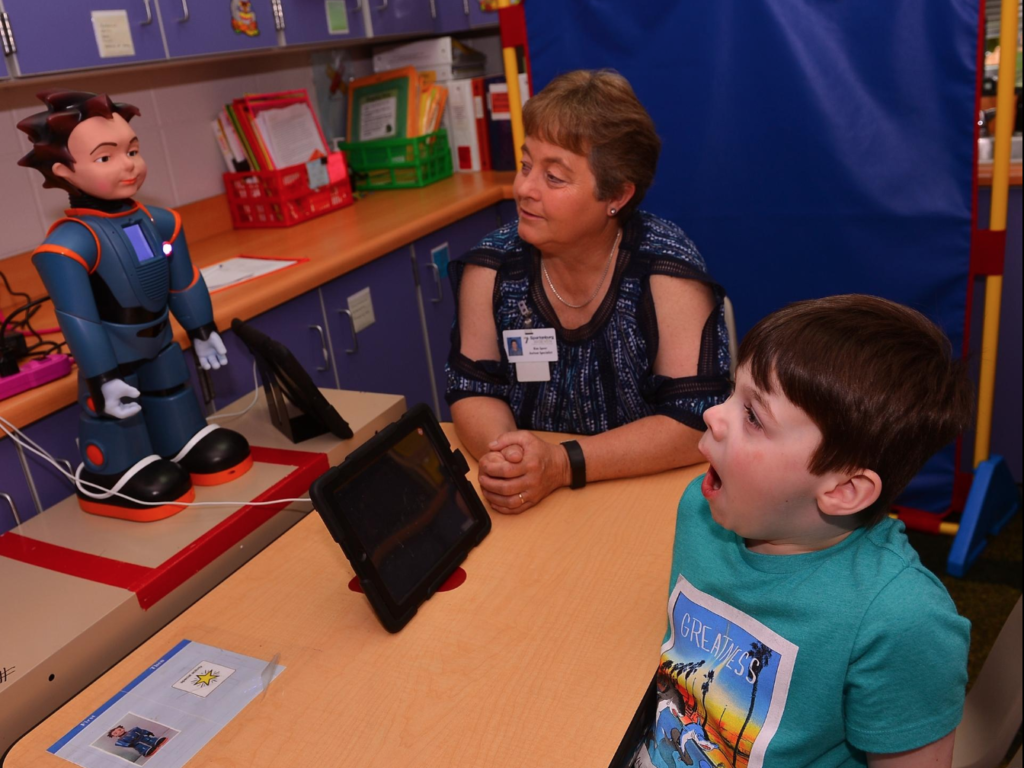By: Conor Hughes

In a small classroom at the McCarthy Teszler School, 6-year-old Jakob Stauber sits with autism specialist Kim Speers and watches as a 2-foot-tall lifelike robot named Milo demonstrate facial expressions and explain what they mean.
After each explanation, a screen in front of Jakob lights up with several pictures of different facial expressions and a prompt asking him to select the one Milo just demonstrated.
Jakob has an autism spectrum disorder, which makes it difficult for him to understand facial cues. Working with Milo helps him to read people’s expressions and body language.
Before enrolling McCarthy Teszler, Jakob was only able to attend school for an hour and fifteen minutes a day because his school didn’t have the resources or expertise to help him work through the challenges that accompany his condition.
Despite the growing number of children diagnosed with autism spectrum disorders, McCarthy Teszler’s autism specialist Elena Ghionis said there is a startling lack of resources for teachers in South Carolina to learn about the disorder to meet the needs of students like Jakob.
“I realized there was not enough training, there was not enough knowledge, there was not enough tools for our county,” she said. “Basically, we do have a (autistic) population, which is growing every year, but we’re not providing enough support, enough tools for the teachers.”
To expand resources available to educators in South Carolina, Ghionis began designing an autism certificate program at Converse College, where she serves as an adjunct professor.
Four years after she had the idea, the five-course program is a reality and recently graduated its first 35 participants, a group of educators, counselors and nurses.
“I’m seeing that my teachers are better equipped now,” Ghionis said. “They can design specific programs for the child, and they can reach every child on the spectrum.”
The program is the first of its kind in South Carolina, and Ghionis said she had to start from scratch when she decided to develop it.
“I pulled the curriculum from every college in the United States who provides this kind of training, and when I looked through, I said, ’This is not enough. This is basic information,” she said. “My teachers need more in-depth knowledge — not only what autism is, but they need to know how to service the population.”
Tamela Robinson, a clinical counselor at McCarthy Teszler, was among the 35 program graduates. She said before taking the courses, she sometimes felt out of her depth with when working with students with autism and often struggled to understand them.
“You hit a brick wall, and you’re literally at that place where you say, ‘If someone doesn’t help me, I’m done,’” she said. “I mean, it could be a career-ender, it feels that way… There was nothing — no map, no support, no knowledge.“
Since going through the program, she said that’s changed.
“I’ve had less crises this year than I’ve had in the past 10 years, and it’s been a long time,” she said. “It was much needed.”
Denise Boyce, who’s worked as a special needs educator for 25 years, was another one of the teachers who completed the new program. She said even after close to three decades working with special needs students, she still gained a lot of information from the course.
“The course has been amazing,” she said. “It gave me so many resources as an educator and as a parent. It’s almost too much to absorb.”
In addition to being a special needs teacher, Boyce has a 17-year-old son named Spencer who has Down syndrome and falls on the autism spectrum. She said the course helped her in the classroom and at home when communicating with her son.
“It helped me with, not just my students, but with my child, to be able to help him learn new things and be able to get into his brain and work with him and his individual needs,” she said.
Ghionis said the main goal of the course was to provide educators with the tools to address the needs of each individual student on the autism spectrum.
“If you’ve met one child with autism, you’ve met only one,” she said. “If you have 20 children or 12 in your class, you need to have enough to be able to build support and program for every child, and this is how, basically, the program was born.”
Ghionis said she hopes to see the program to continue to grow.
“My dream is for our state to provide more programs like this — that this program is not only going to be available for Spartanburg County, but that this program will be available for any educator, any counselor, anyone who’s working in schools,” she said.
To view the article click here.